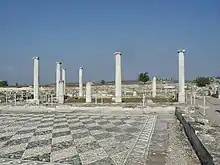Pella
English

An archaeological site at Pella
Etymology
From Latin Pella from Ancient Greek Πέλλα (Pélla), from Ancient Greek πέλλα (pélla) (presumably from an earlier *πέλσα) from Proto-Indo-European *pels- (“stone”). Cognates include Irish aill (“boulder, cliff”), Pashto پرښه (parša, “rock, rocky ledge”)[1], Sanskrit पाषाण m (pāṣāṇa) / पाषी f (pāṣī, “stone”),[2] Proto-Germanic *falisaz, English fell (“rocky ridge”), Old Norse fell / fjall (“mountain”), German Fels (“rock, cliff”)[3]
Proper noun
Pella
- (historical) An ancient city, capital of the ancient kingdom of Macedonia.
- A regional unit of Greece in its periphery of Central Macedonia.
- A town of Greece in Central Macedonia.
References
- http://dsalsrv02.uchicago.edu/cgi-bin/philologic/getobject.pl?c.1:1:4418.raverty
- Monier Williams 1899:624
- Pokorny 1959:807
Latin
Alternative forms
Etymology
Borrowed from Ancient Greek Πέλλα (Pélla).
Pronunciation
- (Classical) IPA(key): /ˈpel.la/, [ˈpɛlːʲä]
- (modern Italianate Ecclesiastical) IPA(key): /ˈpel.la/, [ˈpɛlːä]
Declension
First-declension noun, with locative, singular only.
| Case | Singular |
|---|---|
| Nominative | Pella |
| Genitive | Pellae |
| Dative | Pellae |
| Accusative | Pellam |
| Ablative | Pellā |
| Vocative | Pella |
| Locative | Pellae |
Derived terms
- Pellaeus
References
- “Pella”, in Charlton T. Lewis and Charles Short (1879) A Latin Dictionary, Oxford: Clarendon Press
- Pella in Gaffiot, Félix (1934) Dictionnaire illustré latin-français, Hachette.
- “Pella”, in William Smith, editor (1854, 1857), A Dictionary of Greek and Roman Geography, volume 1 & 2, London: Walton and Maberly
This article is issued from Wiktionary. The text is licensed under Creative Commons - Attribution - Sharealike. Additional terms may apply for the media files.